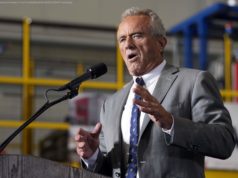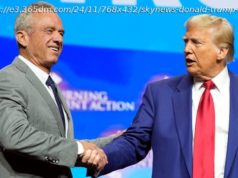Senators on Thursday took turns reviewing a confidential FBI report into alleged sexual assault by Supreme Court nominee Brett M. Kavanaugh as tensions built before a procedural vote scheduled for Friday likely to show if he will be confirmed to the nation’s highest court.
Activists protest and rally in opposition to U. S. Supreme Court nominee Brett Kavanaugh outside the court in Washington on Thursday.
— Senators on Thursday took turns reviewing a confidential FBI report into alleged sexual assault by Supreme Court nominee Brett M. Kavanaugh as tensions built before a procedural vote scheduled for Friday likely to show if he will be confirmed to the nation’s highest court. Two swing Republicans said they believed the FBI investigation was thorough, raising hopes at the White House that they were falling into line and would back Kavanaugh. Their votes could be enough to end what has become a bitter partisan and legal battle in the #MeToo era. Democrats and Republicans got alternating one-hour periods to visit a secure room holding a single copy of the FBI report, which was delivered to Capitol Hill before dawn. Senate Majority Leader Mitch McConnell, R-Ky., said the contents would not be released to the public despite urging from both sides of the aisle. A final vote on Kavanaugh’s nomination is expected on Saturday, but the results probably will be telegraphed with a preliminary vote on whether to proceed. That step is currently scheduled for Friday at 10:30 a.m., although Republican senators said that could change. After an explosive Senate Judiciary Committee hearing on Sept. 27, the White House directed the FBI to conduct a supplemental background check to help senators determine if Kavanaugh assaulted Christine Blasey Ford, a Palo Alto University professor, when they were high school students in 1982, or exposed himself to Deborah Ramirez at a dorm room party when they were classmates at Yale University. Kavanaugh has vehemently denied those allegations. The White House ordered the FBI probe after three Republicans who are seen as swing votes — Sens. Lisa Murkowski of Alaska, Susan Collins of Maine and Jeff Flake of Arizona — said they could not support the nomination unless the FBI was allowed to investigate. The bureau was given one week to conduct interviews, but completed its work two days before the deadline. If no Democrats vote for Kavanaugh, McConnell can afford only one defection from his own caucus. But the White House was upbeat after Collins and Flake said they were pleased by the FBI report despite concerns from Democrats that it was incomplete.“It appears to be a very thorough investigation,” Collins told reporters. Flake agreed, telling reporters that he saw “no additional” corroboration of the allegations against Kavanaugh in the report. If they vote for Kavanaugh, Vice President Mike Pence probably would wind up casting the deciding vote for confirmation. Only two Democrats — Sens. Joe Manchin of West Virginia and Heidi Heitkamp of North Dakota, both facing difficult reelection races in states that Trump won in 2016 — were considered potential supporters of Kavanaugh’s nomination. But Heitkamp said Thursday afternoon that she would not vote for Kavanaugh.“Both sides horribly handled the process around this nomination,” she said in a statement. “We must learn from these mistakes.”Manchin has not announced his decision, and Democratic Senate sources said he is not expected to step forward as the deciding vote. That means Republicans probably need to find enough votes in their own ranks to get to 50. The completion of the FBI report led to a new round of partisan bickering. Republican leaders said the report shows no incriminating information about Kavanaugh, who sits on the D. C. Circuit Court of Appeals.“This investigation found no hint of misconduct and the same is true of the six prior FBI background investigations conducted during Judge Kavanaugh’s 25 years of public service,” Senate Judiciary Chairman Charles E. Grassley, R-Iowa, said in a statement. Democrats insisted the FBI probe was short-circuited and incomplete.“The most notable part of this report is what’s not in it,” Sen. Dianne Feinstein, D-Calif., the ranking Democrat on the Senate Judiciary Committee, told reporters. “It looks to be a product of an incomplete investigation that was limited.”Trump said it would be impossible to appease Democrats. “This is now the 7th time the FBI has investigated Judge Kavanaugh,” he tweeted. “If we made it 100, it would still not be good enough for the Obstructionist Democrats.”Sarah Huckabee Sanders, the White House press secretary, said, “We didn’t learn anything new” from the FBI report. She told reporters that the White House was pleased with the way the FBI conducted its latest investigation, and dismissed criticism that the FBI did not interview all the potential witnesses.“We allowed the FBI to do exactly what they do best,” she said. “We haven’t micromanaged this process. We accommodated all of the Senate’s requests. The President was very clear about that and allowed the FBI to make those decisions.”FBI background checks usually do not examine events before a nominee turns 18, which is when Ford alleges she was assaulted by Kavanaugh. She said that in the summer of 1982, when she was 15 and Kavanaugh was 17, he and a friend drunkenly pushed her into a room at a party and he climbed on top of her, covering her mouth when she tried to shout for help.






